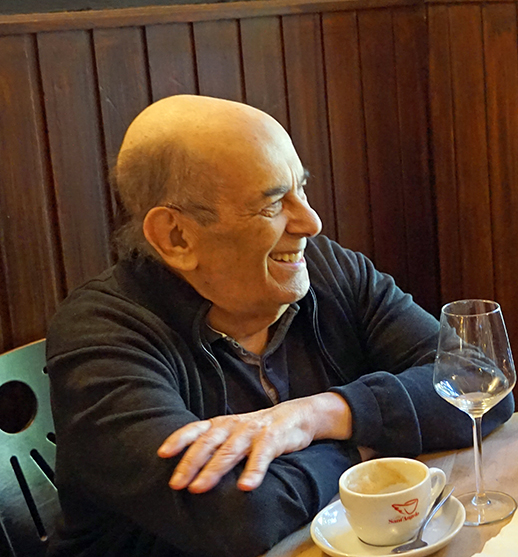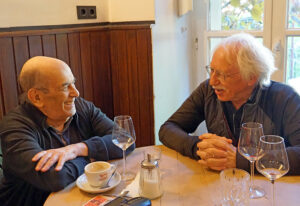
Goodbye Stan Persky
I first met Stan Persky in 1976, when he gave a poetry reading in Prince George. The reading was at the College of New Caledonia, where I taught, and it was organized by our creative-writing instructor, Barry McKinnon. Before the reading, Barry told me that Stan had been one of the instigators of the Georgia Straight, taught “political science or something,” and was involved in “a commie experiment at the college in Terrace.”
I went to the reading, and decided that Stan was a mediocre poet. But what did I know? Barry thought different, and I was still caught up in the pleasures of the Norton Anthology of English Literature, up to but not including the Twentieth Century.
The Georgia Straight, though, was a big deal. When I was at McGill, I’d gotten my parents to pick it up for me, mainly so I could follow the adventures of Harold Hedd. And the “commie experiment” also interested me. Not the “in Terrace” part, and not the “commie” part except that it implied leftist politics. My father was a longshoreman in Vancouver, so I grew up fond of and beholden to unions.
When I arrived at CNC, in 1972, I immediately got involved in the faculty association, which the newly-elected Barrett NDP government wanted converted to a union. This we accomplished. I was on the executive from the time Barrett went down (1975), and the college board got stocked with lawyers, mill-owners and real-estate agents, until the time my marriage broke up (1982), when the board was still stocked with lawyers, mill-owners and real-estate agents, all now trying to get rid of Barry.
The next time I met Stan was in May, 1989, when Rolf Maurer of New Star Press launched Stan’s story book, Buddies, and mine, Small Rain.
By then I’d learned, by hearsay rather than reading, a lot about Stan. My sources were Barry, Rolf, Brian Fawcett and Bill Schermbrucker. Rolf had purchased New Star from Stan and rented space for the press in Stan’s “large, gloomy old house” a block away from Kitsilano beach. Barry had done a degree in creative writing at UBC and he and his wife, Joy, had attended many a party at that house. Brian was a Prince George boy who turned up in town every year on family business (apartments), and who had been a student of Robin Blaser’s, Stan’s partner when he first came to Vancouver. Brian was active with Stan on various publications and causes. Bill was a friend of mine from UBC grad school, who’d become founding faculty at Capilano College where Stan worked after he left Terrace (1980), and who edited Capilano Review that published Stan, Brian and (once or twice) me.
So, I knew by 1989 that Stan had long been a larger-than-life figure in Vancouver, a sort of political provocateur on the side of the left and gay people, a well-known writer of political histories, mostly about Socred BC, a commentator on radio and in the Sun, and the founder, co-founder, or editor of assorted left-oriented political and literary magazines like Iron (1966 – 1978) the Grape (1972 – 1975?), and Western Voice (1976). Stan and other writers spun The Georgia Straight Writing Series off from Georgia Straight in 1969 and that series eventually became New Star Books.
Democracy depends on citizens being informed and voting intelligently, meaning it depends on an illusion. I’d noticed, for example, that very few, in my little band of college faculty, had time for meetings and committees. More primal demands — like getting divorces, making a living, raising kids, following hockey, writing poetry — take over. But Stan, obviously, made time for politics. I comforted myself, and still comfort myself, with the assumption that he was actually interested, something that I could be only when my own interests were immediately at stake.
When our book launch was over, Stan and I wandered off to his favorite bar — not Buddies, the setting of Stan’s book, but something similar, evidently. We ordered beer and gossiped about Vancouver writers. Stan also talked about books that excited him, mostly books in philosophy and political history. I had read none of these books.
After an hour and into our second beer, Stan’s attention drifted off to a big-screen TV that was showing a pornographic film about two young guys delivering pizzas. Not able to compete with this, I downed my beer and left. Stan alluded to this event a few months later, when he signed over to me his next book, Fantasy Government: Bill Vander Zalm and the Future of Social Credit (1989). The inscription read: For John Harris, from Viking Pizza Delivery and Striptogram, Stan Persky. This entitles you to one free . . . .
By then I’d read Buddies. I had trouble, at first, with what I saw as a great deal of pretention — in the subtitle, Meditations on Desire, and in the references to the philosophers and writers who’d speculated on the topics of love, eros, desire etc: Barthes, Plato, Sartre, Gide and others. Then I realized these references were part of the comedy, a contrast to the actual stories, often told in pornographic purple prose, of Stan’s relationships with his “tricks,” a series of 18-year-old boy-prostitutes identified by the first letter of their last name. The boys themselves are never interesting, but Stan’s attitude to them is.
He holds nothing back about his desire for them, and the erotic possibilities that each one represents. But, apart from the sex, his dealings with them are more fatherly than lustful. If one of them pleads a headache on the way to Stan’s place, Stan is not frustrated or upset. He drives the kid home to his mother, chatting amicably, and he and the kid agree to find a better time. If one of them appears frightened because a tough guy is about to appear to demand payment of a loan, Stan hands over the money and waits to see the scam work itself out, appraising the boy’s and tough-guy’s acting abilities.
And then there’s “George” — George Stanley to whom the book is dedicated. George expresses, but infinitely intelligently and usually with great humour or withering sarcasm, the reader’s objections to Stan’s activity and philosophic pretentions. He is constantly bringing Stan down to earth, and at the same time lifting him to enlightenment, usually by disconnecting love entirely from sex: “Love is the compassionate understanding of the discord between the heart and the world.”
I started doing lunch with Stan, whenever I came to Vancouver, adding him to my repertoire of Rolf, Brian and Bill. Soon my new wife Vivien Lougheed, a writer of travel columns and guidebooks, joined in. More gossip and conversation, with a new feature: Stan and Viv objectifying the shapely butt of some waiter.
Long before I’d started writing the stories in Small Rain, I wrote a lot of articles and book reviews, for everything from Canadian Fiction Magazine through Canadian Forum, Essays in Canadian Writing and Brick. As time went on, my reviews turned analytical and got obsessive, or long. Bruce Serafin, at Vancouver Review (1990 – 2002) took some (as well as some of Viv’s stories), but I could find a home for nowhere near the number I was churning out. Then, at the turn of the millennium, Stan and Brian launched their e-magazine, dooneyscafe, and welcomed me aboard.
As a contributor, I ended up just below them in number of contributions — a very, very distant third overall. Brian, not Stan, edited me, Stan taking over only when Brian disappeared down the rabbit-hole of his love life and Stan popped up as “the only adult in the room.” He was a good editor, instantly calling me on my obsessive passages.
Stan was the best essayist among us. Two of Rolf’s collections of these essays — The Short Version (2005) and Topic Sentence (2007) — are now my favourite of Stan’s books. I figure it has something to do with age: reality gets scary, so one wants to cozy up to rationality.
Soon after dooneyscafe started, Stan left for Berlin, and our Vancouver lunches ended. So did any significant epistolary contact, except the occasional edit and Stan’s Facebook messages, received by Viv and shared by her with me. But we saw Stan in Berlin two years ago, on a trip to hook up with him as well as a number of European friends who had trekked and traveled with us. We were pretty sure, considering our age (early eighties) and condition, this would be the last time we’d see our friends. About Stan, two years older than us and not well, we were certain this would be the case.
We caught him at a lucky time. He was feeling better, and was as lively and chatty as ever. And he was still addicted to cafes, this time a particular German one that he frequented daily — the Kastanie. Sure enough, it featured a giant chestnut tree in front. Stan wasn’t sitting beneath it, as a philosopher might. It was too cold. He was inside at his favorite table, an alcove by the window looking out at the tree.
The Vancouver literary gossip and book lists continued as if they’d never been interrupted. Viv and I expressed our admiration for George Stanley’s poetry, and Stan told us that George had for some reason not gotten into the crucial Donald Allen anthology, The New American Poetry, and thus missed what would’ve been a giant step to certain, early fame. He also told us that he and Brian (and now Brian’s estate) were supplementing George’s income so he could stay in Vancouver. He joked that their supplement wouldn’t even cover the beer.
Viv asked Stan about his medical situation. Stan didn’t know much, intentionally so, but explained that he was cared for by Thomas Marguard and his family, in exchange for which Stan was teaching their daughters English. Thomas appeared, on his lunch hour it seemed, and talked to us about wanting to see Alaska and the Yukon. We told him we were right along the way if he wanted to access those places via the Alaska Highway. He took our contact data, and the titles of the books we’d written about Kluane and Nahanni National Parks.
Thomas went back to work and the talk continued, mostly now about operations, symptoms and side-effects. Here, Stan’s attention turned almost entirely to Viv, in real life and long ago a medical lab technologist. It was my turn to contemplate the waiter, a middle-aged woman to whom Stan spoke in what he called “functional” German.
After three hours of talk, we accompanied Stan home. He explained to us that this area of Berlin (surrounding Charlottesburg Castle) had survived the bombing and fighting during WW II, thus the beautiful buildings and parks. We said our goodbys in front of his apartment building — and it was beautiful. As he clattered with his walker up the steps and through the door, one of his neighbours, holding the door open for him, looked over at us, smiled, and patted his heart.
